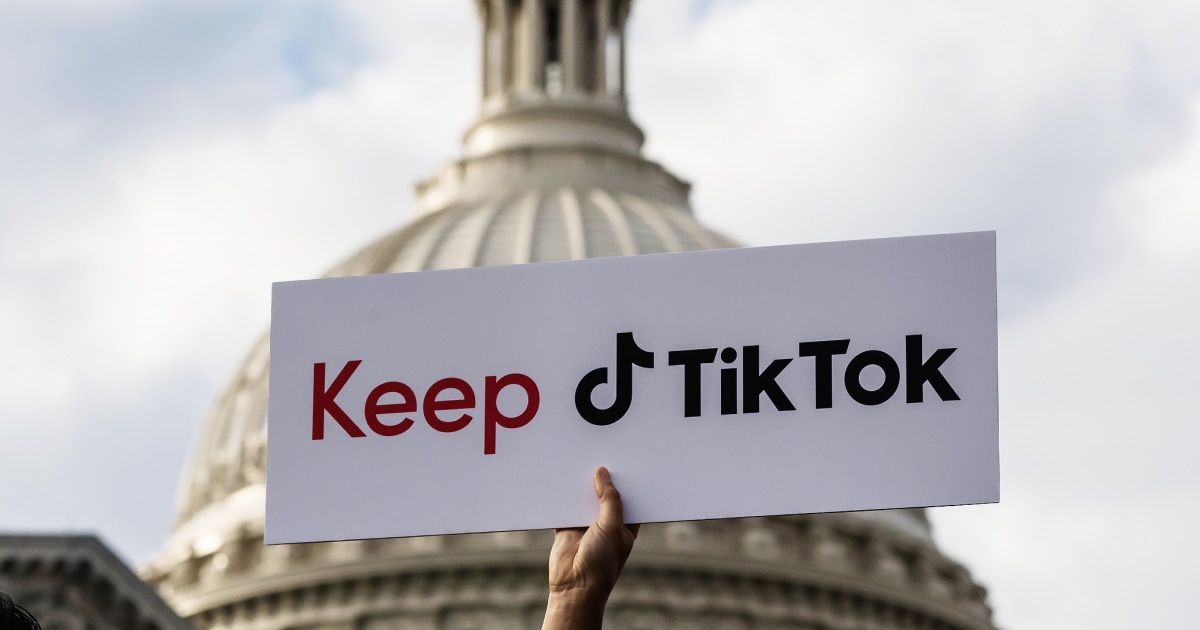Biden administration has no plans to fine companies if TikTok ban goes into effect
WASHINGTON — The Biden administration does not plan to levy billions of dollars in fines against companies that allow access to TikTok in the U.S., as is stipulated by law if a ban of the popular app goes into effect on Sunday, according to two administration officials.
The administration has decided to defer implementation of the law banning TikTok in the U.S. to the incoming Trump administration, the officials said, effectively not enforcing it during the final 36 hours of President Joe Biden’s term in office.
“Given the timing of when it goes into effect over a holiday weekend a day before inauguration, it will be up to the next administration to implement,” a White House official said.
The move is aimed at trying to ensure there is no disruption in TikTok users’ access to the app in the U.S. before President-elect Donald Trump’s inauguration on Monday, despite the ban. It comes as the Supreme Court could rule at any time on whether to uphold the ban.
Trump has vowed to save TikTok from the ban, which Congress passed with bipartisan support and Biden signed into law last April citing concerns that the app’s Chinese ownership makes it a national security threat to the U.S. The president-elect’s team has been exploring options for keeping TikTok operating in the U.S.
The Justice Department declined to comment.
Under the law, TikTok — as well as companies that help provide users with access to the app, such as Apple, Google and internet hosting services like Oracle — potentially face fines totaling at least $850 billion if they don’t shut down that access on Jan. 19.
The White House has been under pressure to stop a ban from going into effect, including from Democrats. NBC News first reported Wednesday that the Biden administration was considering ways to keep TikTok available in the U.S. if a ban goes into effect on Sunday.
On Thursday, Senate Minority Leader Chuck Schumer (D-N.Y.) said he supports delaying the Jan. 19 deadline for TikTok to sell or be banned in the U.S.
“It’s clear that more time is needed to find an American buyer and not disrupt the lives and livelihoods of millions of Americans, of so many influencers who have built up a good network of followers,” Schumer said in remarks on the Senate floor.
Schumer said he has made his views “clear to the current administration, and I will work with the Trump administration and with both parties to keep TikTok alive while protecting our national security.”
He also pointed to the reason lawmakers and the president supported a ban of TikTok in the U.S. if its Chinese parent company ByteDance does not sell — national security concerns — as a continuing issue.
Despite the Biden administration, Democrats and Republicans who voted for the law and Trump seeking to keep TikTok from going dark, all have raised concerns about the app in the past. Trump initially sought to ban it in the U.S. during his first term.
His August 2020 executive order attempting to do so stipulated, “TikTok automatically captures vast swaths of information from its users, including Internet and other network activity information such as location data and browsing and search histories. This data collection threatens to allow the Chinese Communist Party access to Americans’ personal and proprietary information.”
Those same national security concerns have not abated, according to U.S. officials.
Last month, Jake Sullivan, Biden’s national security adviser, said, “Our intelligence professionals, our national security professionals — not the politicians, the professionals — have looked at this and have seen the national security risks.”
FBI Director Christopher Wray also has warned of risks to national security because of the app’s Chinese ownership.
“The ability to collect the data, the ability to control the recommendation algorithm, which means the ability to push CCP narratives, pro-CCP narratives, downplay criticism of the Chinese government, in effect, enlist millions of users as unwitting advocates of CCP propaganda,” Wray said last year in an interview with NBC News’ Lester Holt.
TikTok has argued there is not a threat to U.S. national security.
While the law that would ban TikTok does not include an exemption for beginning to fine companies who violate it because of a federal holiday weekend — Monday is Martin Luther King, Jr. Day — or a presidential inauguration. But administration officials cited both as reasons the Justice Department would not issue any fines or implement the ban on Sunday.
The White House official reiterated the administration’s position on the future of TikTok, saying, “Our position on this has been clear: TikTok should continue to operate but under American ownership.”
The concern U.S. officials have had about TikTok, as outlined by the FBI on numerous occasions, is that the data its owner ByteDance collects is subject to Chinese laws, and therefore ByteDance has no choice but to share user data with that government.
That would allow China to know where a U.S. user of TikTok might be, what other apps they might be using, what their personal preferences are, any messages they exchange, and many other data points, officials have said in past briefings on the matter.
The second threat U.S. officials have previously cited is that China could manipulate the app’s content algorithms to shunt anti-Chinese government views or promote views to the benefit of the Chinese government in ways that would not be readily apparent to most users.


